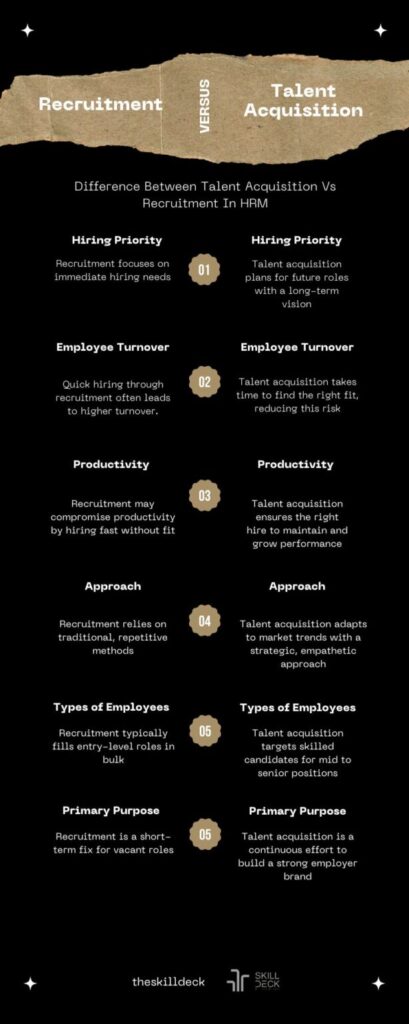Talent Acquisition vs Recruitment: The Key Differences You Need to Know
Understanding the Difference Between Talent Acquisition vs Recruitment
Is talent acquisition the same as recruitment?
Talent acquisition and recruitment are two hiring practices to build a strong workforce. Both aim to get the most qualified candidates for a job. But this is where the similarities between the two end.
The difference between talent acquisition vs recruitment in HRM far outweighs the similarities, as both hiring strategies vary in their scope and objectives.
Talent acquisition is about playing the long game with workforce planning, acquisition pipeline setup, and employee relationship building, while recruitment aims to fill vacant positions in the company quickly.
Understanding the key differences between talent acquisition and recruitment can help you meet your immediate hiring demands and create a high-achieving workforce that drives long-term business success.
What Is Talent Acquisition?
Talent Acquisition is a long-term strategy that focuses on the future goals and aspirations of the company. Unlike recruitment, which faces time constraints, talent acquisition specialists can take their time to hire the best candidates for key positions in the company.
Talent acquisition strategies often involve inputs from multiple departments and organization leaders. While HR Teams leverage job portals, company websites and application tracking software, they also rely on social networking platforms, conferences, webinars, industry events and online forums to attract promising talent.
HR Teams also demonstrate flexibility and adaptability in –
- workforce planning
- Setting the acquisition pipeline
- And ensuring the presence of skilled individuals in the crucial company roles at all times
Since talent acquisition focuses on future workforce needs.
What Is Recruitment?
While talent acquisition plays the long game, recruitment focuses on quick hiring practices to fill immediate positions in the company. It is a necessary process that starts immediately when employees in important operational roles vacate their positions.
The recruitment process follows a static approach due to the hiring urgency. You will find the HR recruiters –
- posting job openings
- Screening multiple applications
- and scheduled interviews
Due to time constraints, HR recruiters heavily rely on job portals, company websites, and applicant tracking software (ATS) to find the right candidates for the company.
What Is The Difference Between Talent Acquisition Vs Recruitment In HRM?

Talent Acquisition vs Recruitment: Hiring for Now vs Building for Tomorrow
Hiring Priority
Recruitment is concerned with the immediate hiring needs of a company, while talent acquisition is future workforce-oriented. That means recruitment prioritizes faster strategy deployment for quick hiring over talent acquisition.
Employee Turnover
Talent acquisition strategies take time to hire the best candidates for the job, with planning, research, and third-party inputs. Meanwhile, recruitment results in more employee turnover. This is because HR executives have to fill key job vacancies in the organisation quickly during recruitment, leaving them less time for accurate employee compatibility testing.
Productivity
In a talent acquisition vs recruitment debate, we would argue that a company’s productivity is more reliant on talent acquisition. This has to do with the fact that recruitment focuses on faster hiring over employee compatibility, sometimes resulting in incompatible employees who affect a company’s bottom line. Meanwhile, talent acquisition ensures that the right candidates not only maintain productivity but also scale it.
Static Vs Dynamic Approaches
Recruiters follow the same hiring procedures (they have used previously) to recruit employees quickly. On the other hand, talent acquisition managers take a strategic route where they analyse the current and future staffing needs and market trends. They also adopt a more empathic approach, opposed to the salesmanship stance of recruiters to attract promising people.
Types Of Employees
Recruiter hires people for entry-level positions in the organisation, while talent acquisition managers focus on people with a certain skill set required to occupy middle and senior-level positions. That also means that the volume of hires by recruiters will be more than talent acquisition managers.
Primary Purpose
- Recruitment is a one-time process that focuses on filling vacant positions in the organisation.
- Talent Acquisition is an ongoing process of creating a strong employee brand.
Why Should HR Teams Know The Difference Between Talent Acquisition vs Recruitment?
Aligns Strategy With Business Goals
Helps HR plan for both immediate needs and future growth
Improves hiring efficiency
Knowing when to recruit vs when to acquire talent saves time and resources.
Boosts Candidate Quality
Strategic talent acquisition attracts better-fit candidates long-term.
Minimize Turnover
A thoughtful approach leads to more engaged, loyal employees.
Strengthens Employer Brand
Ongoing talent engagement builds a positive perception in the market.
